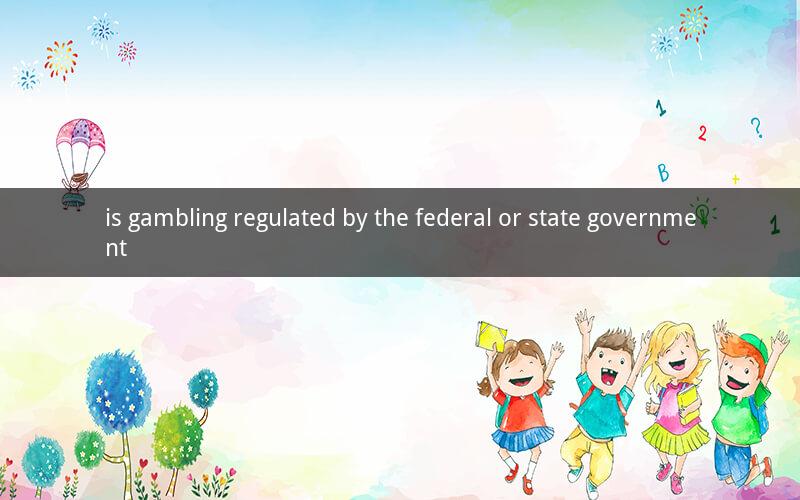
Directory
1. Introduction to Gambling Regulation
2. Federal vs. State Regulation of Gambling
3. Historical Perspectives on Gambling Regulation
4. The Role of the Federal Government in Gambling Regulation
5. State-Level Gambling Regulation: A Case Study
6. Challenges and Conflicts in Gambling Regulation
7. Impact of Gambling Regulation on Consumers
8. The Economic Aspects of Gambling Regulation
9. Legal and Ethical Considerations in Gambling Regulation
10. Future Trends in Gambling Regulation
Introduction to Gambling Regulation
Gambling, as a form of entertainment, has been present in various forms throughout human history. Its regulation, however, has evolved significantly with the passage of time. The question of whether gambling is regulated by the federal or state government is a complex one, with implications for public policy, economic interests, and social welfare.
Federal vs. State Regulation of Gambling
Gambling regulation in the United States is a shared responsibility between the federal government and individual states. While the federal government has some authority over gambling, states have the primary role in regulating this activity within their borders.
Historical Perspectives on Gambling Regulation
Historically, gambling has been subject to various laws and regulations. The federal government has played a role in this regulation through the passage of important legislation such as the Wire Act of 1961 and the Professional and Amateur Sports Protection Act of 1992. Despite these federal laws, states have continued to establish their own gambling policies.
The Role of the Federal Government in Gambling Regulation
The federal government primarily regulates gambling through the enforcement of specific laws. The Wire Act, for example, prohibits the use of wire communication for the transmission of bets or wagers across state lines. The Unlawful Internet Gambling Enforcement Act of 2006 (UIGEA) aims to prevent the use of the internet for illegal gambling activities. While these laws have had a significant impact on the gambling industry, the federal government's role is generally limited to these specific areas.
State-Level Gambling Regulation: A Case Study
Each state in the United States has its own approach to gambling regulation. For instance, Nevada is known for its robust casino industry, while other states have chosen to limit gambling to lottery games and horse racing. A case study of a state's gambling regulations can provide insight into the complexities of state-level regulation.
Challenges and Conflicts in Gambling Regulation
Gambling regulation faces numerous challenges and conflicts. Issues such as the potential for addiction, money laundering, and organized crime are significant concerns. Additionally, the balance between generating revenue for states and protecting public welfare is often a contentious issue.
Impact of Gambling Regulation on Consumers
Consumers are affected by gambling regulation in several ways. Regulations can impact the availability of gambling options, the type of games offered, and the safety and security of gambling activities. The impact on consumers is a critical aspect of evaluating the effectiveness of gambling regulation.
The Economic Aspects of Gambling Regulation
Gambling regulation has economic implications for both the government and the industry. States that allow gambling often benefit from increased tax revenue and job creation. However, the economic benefits must be weighed against the potential social costs associated with gambling.
Legal and Ethical Considerations in Gambling Regulation
The legal and ethical considerations in gambling regulation are complex. Issues such as the protection of minors, the prevention of gambling addiction, and the promotion of fair play are all part of the regulatory framework. Balancing these considerations is a challenge for policymakers.
Future Trends in Gambling Regulation
The future of gambling regulation is shaped by technological advancements, evolving public opinion, and changes in the legal landscape. Trends such as the expansion of online gambling and the integration of gambling with other forms of entertainment are likely to influence future regulations.
---
FAQs
1. What is the primary difference between federal and state gambling regulation?
- The primary difference lies in the scope of regulation. Federal laws apply across the nation, while state laws are specific to each state.
2. How has the Wire Act impacted the gambling industry?
- The Wire Act has limited the ability of operators to offer certain types of gambling across state lines, affecting the online gambling market.
3. What is the UIGEA, and what does it do?
- The UIGEA aims to prevent the use of the internet for illegal gambling activities by imposing restrictions on financial transactions related to online gambling.
4. Can a state completely ban gambling within its borders?
- Yes, states have the authority to ban gambling entirely within their borders, although most states have some form of regulated gambling.
5. What are some of the challenges faced by state gambling regulators?
- Challenges include balancing economic interests with social welfare, preventing illegal gambling activities, and addressing issues related to gambling addiction.
6. How do gambling regulations affect the availability of gambling options for consumers?
- Regulations can limit the types of gambling available, the number of gambling facilities, and the locations where gambling is permitted.
7. What is the role of the Federal Bureau of Investigation (FBI) in gambling regulation?
- The FBI plays a role in enforcing federal gambling laws, investigating illegal gambling activities, and preventing money laundering.
8. How do gambling regulations differ between land-based and online gambling?
- Land-based gambling regulations often focus on physical locations and the activities that can be offered, while online gambling regulations address the use of the internet for gambling purposes.
9. What are some of the ethical concerns associated with gambling regulation?
- Ethical concerns include the protection of vulnerable populations, the promotion of fair play, and the prevention of gambling-related harm.
10. What are some of the potential future trends in gambling regulation?
- Future trends may include the expansion of online gambling, the integration of gambling with other forms of entertainment, and the use of technology to improve regulation and consumer protection.